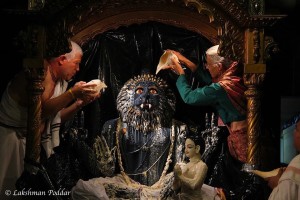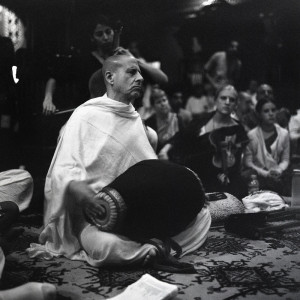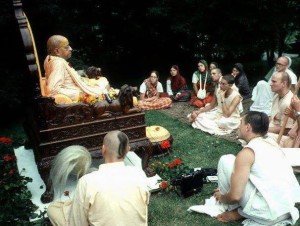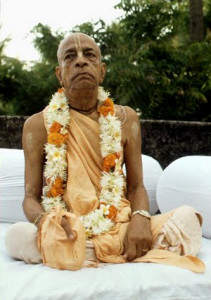
Speaker: HH Lokanath Swami
Venue: Mayapur Candrodaya Mandir
Date: 7 March 2016
So thats the verse, Eleventh Canto, Chapter 5, Text 32. Are you familiar, if you have looked at the board? Yeah! Sounds familiar? Not new! But ever ever new also at the same time! Never becomes old!
So here we are in land of Gauranga, Gauranga! (Devotees respond: Gauranga!) Sri Krishna Caitanya Mahaprabhu ki (Devotees respond: Jaya!) And also we have gathered here amongst other reasons, gathered here for Kirtan Mela ki (Devotees respond: Jaya!) Yes, you have come here for Kirtan Mela! Some of you have just come for the Kirtan Mela. Don’t show me hands! You have hands, I know! So you are here for the Kirtan Mela, many of you. So I thought of selecting a verse that talks of Caitanya Mahaprabhu as well as of course talks about the kirtana, sankirtana- yajna, that we are engaged in here. So quickly as time is running.
krsna-varnam tvisakrsnam
sangopangastra-parsadam
yajñaih sankirtana-prayair
yajanti hi su-medhasah ( SB 11.5.32)
Translation and Purport by disciples of His Divine Grace A C Bhaktivedanta Swami Srila Prabhupada ki (Devotees respond: Jaya!)
“In the Age of Kali, intelligent persons perform congregational chanting to worship the incarnation of Godhead who constantly sings the names of Krsna. Although His complexion is not blackish, He is Krsna Himself. He is accompanied by His associates, servants, weapons and confidential companions.”
Purport
“This same verse is quoted by Kṛṣṇadasa Kaviraja in the Caitanya-caritamṛta, Adi-lila, Chapter Three, verse 52….”
Maharaja: And I was reminded that Laghu Bhagavatamrta of Rupa Goswami, he also quotes this verse in the very beginning of Laghu Bhagavatamrta, Rupa Goswami does, its part of his mangalacarana, same verse.
“His Divine Grace A.C. Bhaktivedanta Swami Prabhupada has given the following commentary on this verse. “This text is from Srimad-Bhagavatam (11.5.32). Srila Jiva Gosvami has explained this verse in his commentary on the Bhagavatam known as the Krama-sandarbha, wherein he says that Lord Kṛṣṇa also appears with a golden complexion. That golden Lord Kṛṣṇa is Lord Caitanya,….”
Maharaja: Did you hear that, “That golden Lord Kṛṣṇa is Lord Caitanya.” Very nice the way Prabhupada is commenting based on Krama-sandarbha.
“who is worshiped by intelligent men in this age. That is confirmed in Srimad-Bhagavatam by Garga Muni, who said that although the child Kṛṣṇa was blackish, He also appears in three other colours — red, white and yellow….”
Maharaja: idanim krsnatam gatah (SB 10.8.13), Garga Muni, idanim krsnataam gatah, now He has become Krishna. But previously He was, suklo raktas tatha pita (SB 10.8.13). He has three other colours, sukla-white in Satya Yuga, rakta-red in Treta Yuga and pita….(indistinct) and now He has appeared in Dvapara Yuga as Krishna, so what is the remaining age, Kali Yuga, pita. So four colours mentioned and then he had already mentioned three ages. So fourth age is Kali and pita is remaining colour, so that is Sri Krishna Caitanya Mahaprabhu’s colour.
“who said that although the child Kṛṣṇa was blackish, He also appears in three other colors — red, white and yellow. He exhibited His white and red complexions in the Satya and Tretā ages respectively. He did not exhibit the remaining color, yellow-gold, until He appeared as Lord Caitanya, who is known as Gaurahari….”
Maharaja: Hari who is Gaura. Either Gauranga whose complexion is Gaura anga, golden complexion or Hari Hari (aside: What happened? No dont look behind! You! Sleeping so, the one who is sleeping he looks at, not me! This always happens! This is very human! Indians, Africans, whatever! He looks behind! Not me!) So Gaurahari! He is Hari, but what kind of Hari He is? (Devotees respond: Gaurahari) Gaurahari! Don’t just say Hari! Hari! Say Gaurahari!
“Srila Jiva Gosvami explains that kṛṣṇa-varṇam means Sri Kṛṣṇa Caitanya…”
Maharaja: That is he is getting back to the verse, there is kṛṣṇa-varṇam and that refers to Caitanya.
“Kṛṣṇa-varṇam and Kṛṣṇa Caitanya are equivalent. The name Kṛṣṇa appears with both Lord Kṛṣṇa and Lord Caitanya Kṛṣṇa.”
Maharaja: namo maha-vadanyaya krsna-prema-pradaya te krsnaya krsna-caitanya-namne, that part, I offer my obeisances unto krsnaya, krsnaya because namah is there, I offer my obeisances unto Krishna, you say that in Sanskrit as krsnaya, which kind of Krishna, krsnaya krsna-caitanya-namne, Krishna whose name is Krsna Caitanya, unto that Krishna I offer my obeisances. krsnaya krsna-caitanya-namne, Krishna whose name is Krsna Caitanya, I offer my obeisances unto Him.
“Lord Sri Caitanya Mahaprabhu is the Supreme Personality of Godhead, but He always engages in describing Kṛṣṇa and thus enjoying transcendental bliss by chanting and remembering His name and form. Lord Kṛṣṇa Himself…”
Maharaja: So that is kṛṣṇa-varṇam, anyway I will go ahead, keep going and then get back.
“Lord Kṛṣṇa Himself appears as Lord Caitanya to preach the highest gospel. Varṇayati means ‘utters’ or ‘describes.’ Lord Caitanya always chants the holy name of Kṛṣṇa and describes it also….”
Maharaja: He chants and He describes. And that is why He is called here as kṛṣṇa-varṇam, the very first word of this verse is what, kṛṣṇa-varṇam, kṛṣṇa-varṇam, varna. So Krishna, these are varna’s. Also varnan, from that comes, varhah, description. So kṛṣṇa-varṇam, who always chants and describes, so thats kṛṣṇa-varṇam.
“and because He is Kṛṣṇa Himself, whoever meets Him will automatically chant the holy name of Kṛṣṇa and later describe it to others…”
Maharaja: Yes, you are doing that. You chant and then you describe it to others. Thats preaching.
“He injects one with transcendental Kṛṣṇa consciousness, which merges the chanter in transcendental bliss…”
Maharaja: Many fans. I am not fan of a fan! But I know some of you don’t survive without fans.
“In all respects, therefore, He appears before everyone as Kṛṣṇa, either by personality or by sound…”
Maharaja: He appears as personality or sound. Personality is there in the form of vigraha and sound is,
Hare Krishna Hare Krishna Krishna Krishna Hare Hare
Hare Rama Hare Rama Rama Rama Hare Hare
He appeared you could say. And there is no difference. The form and the description, not different. Or form and the sound no difference, form and the sound.
‘Simply by seeing Lord Caitanya one at once remembers Lord Kṛṣṇa. One may therefore accept Him as viṣṇu-tattva. In other words, Lord Caitanya is Lord Kṛṣṇa Himself.”
Haribol! (Devotees: Haribol!)
So its a long purport but we don’t have long time for the class here. So I will kind of stop there and well go to the verse and make few comments. Some comments have been made and we’ve already read, we heard. But we could make few more connections.
Earlier in this same chapter question was raised by Nimi, King Nimi and Karabhajana Muni, he is talking to Karabhajana Muni. It is a dialogue between King Nimi and Karabhajana Muni. And the question raised was,
sri-rajovaca
kasmin kale sa bhagavan
kim varnah kidrso nrbhih
namna va kena vidhina
pujyate tad ihocyatam (SB 11.5.19)
Please tell me, kasmin kale, or kasmin yuge, in which age, bhagavan kim varnah, Lord appears in which kind of varnah, or complexion, colour. namna, or what name does He become known as in different ages, kena vidhina pujyate and by which process, paddhati, mode of worship He is worshipped in or worshipped by.
So he was interested to know in which age, which Lord, which incarnation, colour, please tell me colour, please tell me the name, please tell me the process He is worshipped. So after Satya, Treta, and Dvapara, he has already given reply to those questions or those ages have been described. Which Lord appears and what colour does He appear and how is He worshipped and what are the names. And now is the turn of the age of Kali and then he talks of this verse.
In the age of Kali, the Lord appears, krsna-varnam tvisakrsnam sangopangastra-parsadam, so this kind of Krishna, Lord appears in the age of Kali, krsna-varnam, krsna varna, He always chants,
Krsna Krsna Krsna Krsna Krsna Krsna Krsna he!
Like that. krsna-varnam, He always chants and always describes Krishna, thats krsna-varnam, krsna varna tvisa akrsna, tvisa refers to the lustre, complexion, ok what kind of complexion, a-krsnam, a means no, krsna means black. He does not appear as a blackish complexion. Opposite of black is what? White, more than white! He appears as golden, which is very close, white plus much more! krsna-varnam tvisakrsnam and that one also, krsnaya krsna-caitanya-namne gaura-tvise namah, same tvisa is, you find tvisa here and that pranama mantra of Sri Krishna Caitanya Mahaprabhu there is also tvisa, tvisa, grammar has done something to that tvisa,
So gaura-tvise, I offer my obeisances unto the Lord who is of golden complexion, like that mantra we offer obeisances with.
namo maha-vadanyaya
krsna-prema-pradaya te
krsnaya krsna-caitanya-
namne gaura-tvise namah
Four things quickly, four things are mentioned, Krishna’s, Lord’s name is mentioned, what is His name, krsnaya krsna-caitanya, then His form is mentioned, what kind of form, gaura-tvise, form of the Lord, gaura-tvise is a form. So name, form, and quality, what is the quality of, namo maha-vadanyaya, this is the quality of Sri Krishna Caitanya Mahaprabhu, amongst all or many, so many qualities, this is predominating quality of Sri Krishna Caitanya. He is namo maha-vadanyaya, maha, most magnanimous, matchless Lord, no one comes close to Him when we talk of the magnanimity of the Lord. So namo maha-vadanyaya, this is, this is the quality, guna of the Lord and what is remaining, nama, rupa, guna and lila, the pastimes, so what is the pastime of this Lord Gauranga, namo maha-vadanyaya krsna-prema-pradaya te, krsna-prema-prada, krsna-prema-prada, da the giver of Krishna prema, prada, He gives so much, prakrsta rupena, gives so much. So its not only, like narada, just da there but prada, He gives so much, ocean of prema. So that pranama mantra itself has nama, rupa, guna, lila of Gauranga.
So tvisakrsna, tvisa, refers to complexion of the Lord which is a-krsna, not black. sangopangastra-parsadam, so there are four items here. The letter sa there, sa means with, equipped with, with that, sa anga, anga, upanga, sangopangastra, astra, sangopangastra-parsada, fourth is parsada.
sa anga, sa upanga, sa astra, sa parsada, He appears along with all these items here. So He appears with anga, limbs, they are like a part of Him. So Nityananda, Advaita is anga of the Lord. In the commentaries by acharyas, Jiva Goswami they explain this. Bhaktisiddhanta Sarasvati Thakura also quoting other commentators. Srila Prabhupada briefly does mention, we did not reach that part in the purport.
upanga, Srivasa and many many devotees are upanga’s. So anga, upanga, sastra,
Hare Krishna Hare Krishna Krishna Krishna Hare Hare
Hare Rama Hare Rama Rama Rama Hare Hare
is a sastra, is a weapon, to do what, paritranaya sadhunam vinasaya ca duskrtam (Bg 4.8), there are so many duskritina’s, dusta’s the demons, Haribol! I did say Haribol for some other reason but I thought some one was sleeping, so, I dislike the sleepers. They always get my attention, what to do? Its my weakness.
So sastra the holy name, so the sastra’s are used for killing the demons. But the Lord has appeared as the most magnanimous. So this time His weapons are not the normal usual bow and arrow, the axe like a Parasurama is using, Krishna is Sudarshana. In fact when Nityananda Prabhu was attacked, offended Caitanya Mahaprabhu had appeared on the scene with Sudarshana! But then He was reminded, No, No, No, Nityananda Prabhu, not in this age, not this weapon. The weapon is,
Hare Krishna Hare Krishna Krishna Krishna Hare Hare
Hare Rama Hare Rama Rama Rama Hare Hare
It is also described that Lord’s beauty is also weapon. The demoniac mentality or demoniac consciousness is killed or defeated just by the beauty of Gauranga. He was so beautiful, just by looking at Him, the arrows are shot at, at the person who is looking at Mahaprabhu and he is killed in no time. His beauty is the weapon, captivating, capturing and then that person surrenders unto Gauranga.
So there are the astra’s mentioned, there are several astra’s. Prasadam is also astra. And hence comes the ISKCON bullet, ISKCON bullets are gulab jamuns. And you are finished! So Prabhupada just fed prasada and so many demons, American demons, demoniac nature was killed. There were hippies, there were demons, they chanted Hare krishna, ate gulab jamuns and they were happy. The hippies became happies.
So Prabhupada was senapati bhakta, talking of senapati, sena means army, he is chief in commander and then he made New York his destination. Go to New York. New York the capital of the age of Kali. And upon arrival there he started showering bombs of the holy name and the time bomb his books were also weapons. They would explode but not destroy but construct beautiful heart or consciousness.
So Bhagavatam is a weapon, Bhagavatam is complete, in there is Krishna’s beauty, Krishna’s form, Krishna, Krishna. So sangopangastra-parsadam, His parsada’s are Gadhadhara is His parsada, Govinda was His parsada, Ramananda Raya was His parsada, Rupa Sanatana were His parsada and many others. So all those who were with Him at that time, those who appeared along with Him, they are anga’s limbs or upanga’s secondary limbs, or astra’s the weapons or parsada’s His companions close, they are always around.
yajñaih sankirtana-prayair yajanti hi su-medhasah
So first two lines is one part in this verse. Lord is described. It is just Lord’s description. What kind of Lord is described? Like this, krsna-varnam tvisakrsnam sangopangastra-parsadam, am, am, you see, for some reason it is ‘am’, ‘am’. So they are one family, they are together. They all describe Lord. And here is already established now. He is Sri Krishna Caitanya, because gaura-tvise a-krsna, He is not black, He is golden.
So then the two more parts are there, yajanti hi su-medhasah, su-medhasah yajanti, su-medasah is su means susthu nice wonderful, medhasah intelligent. The most intelligent persons yajanti, they worship, most intelligent persons, what do they do, they worship. Who do they worship? In this verse, they worship krsna-varnam tvisakrsnam sangopangastra-parsadam, su-medhasah yajanti, intelligent persons worship this Lord, Gauranga.
alpa medhasam, Krishna says in Bhagavad Gita, alpa medhasam, those who are less intelligent devan deva-yajo yanti, they worship demigods, less intelligent Lord said. Less intelligent alpa medhasam, here is su-medhasah. Alpa means no or little, and su-medhasah, susthu, so much intelligent, highly intelligent persons, most intelligent persons would go for Gauranga! go for Gauranga! go for Gauranga! go for Gauranga! go for Gauranga!
So yajanti his su-medasah, now they worship this Lord, but how do they worship, what is the mode of worship, what is the process do they adopt, that is the third part. yajñaih sankirtana-prayair su-medhasah yajanti, they worship, how do they worship yajñaih, yajñaih means by performance of yajna and doesn’t stop there, not giving any room for speculation, immediately that yajna’s name is mentioned. Which yajna, sankirtana yajna. There is no yajñaih and then full stop. Period! No! yajñaih sankirtana-prayair yajñaih su-medhasah yajanti, the intelligent persons worship this Lord in the age of Kali by chanting
Hare Krishna Hare Krishna Krishna Krishna Hare Hare
Hare Rama Hare Rama Rama Rama Hare Hare
So you must be intelligent that you have assembled here to worship the Lord who appears in the age of Kali. Worship how, by chanting krsna-varnam, as Lord did personally in fact, krsna-varnam, Lord personally did this. apani acari jagate sikhaya, by His own example He taught others, He taught the whole world. So He chanted 500 years ago personally. All that chanting started in Mayapur, Navadvipa and He takes sannyasa, He travels all over India chanting and dancing and the way He has shaken up, shaken, shaken up the whole world, or universe and left the vibrations – Hare Krishna! Hare Krishna! So that is what is shaking us up, waking us up, those vibrations are still in the air! Of course He has not stopped chanting, still He is here, Gauranga is here! kona kona bhagyavan dekhi bare pare, those who are fortunate they could even see today, Gauranga Mahaprabhu performing His pastimes and His pastimes here are kirtana lila.
And same lila Prabhupada expanded that. Mahaprabhu chanted just within the boundaries of India and Prabhupada said, ‘Mahaprabhu left this job of spreading, chanting beyond the boundaries of India up to the International Society for Krishna Consciousness.’ (Devotees: Haribol!) So he became the founder acharya 50 years ago, ISKCON was founded, and then same sankirtanaih kapitarau, as sankirtana was started by Mahaprabhu here was then inauguration took place and now it has reached far and wide. And what is the indication, how do we know it has reached far and wide? Right here, we see the faces from around the world, we heard day before yesterday devotees from 70 countries are here. (Devotees: Haribol!)
And then I say, I have been saying this, from nama to dhama. Devotees receive nama wherever they are, in their country they receive nama, and that nama the holy name brings them to dhama. (Devotees: Haribol!) So nama to dhama.
So one day will come as predicted by Caitanya Mahaprabhu, this yajnah, sankirtana-yajnah will be performed in every town, every village of this planet. And from every village, from every town devotees will be making plans to come to Mayapur for Kirtan Mela, amongst other festival aspects. And they will coming from every little town, Timbaktu, there is a Timbaktu, Timbaktu, from there also they will come. So this is just the beginning, this is just the beginning, 50 years passed and now another 9000 years to go. You could imagine. This temple which is going to hold 10000 devotees, the TOVP temple in the front is built to accommodate how many devotees,10000 but for sure as soon as temple is opened it will be filled, it will be packed. (Devotees: Haribol!) Then we have to make plans for bigger temple, or stadium, there is some talk up.
Ok Thank you very much!
Source: http://m.dandavats.com/?p=19564







 Sat 11: West Bletchley Ratha Yatra / Carnival (Parasuram)
Sat 11: West Bletchley Ratha Yatra / Carnival (Parasuram)


